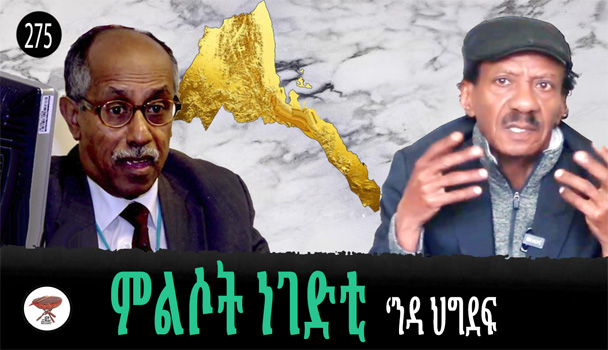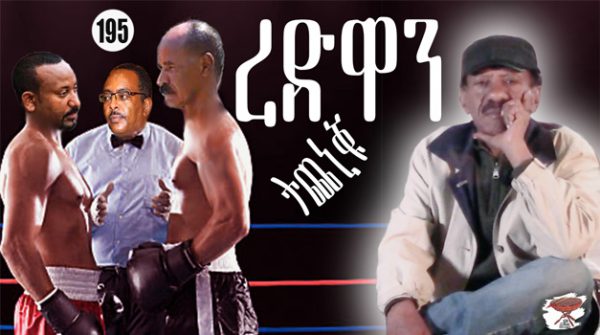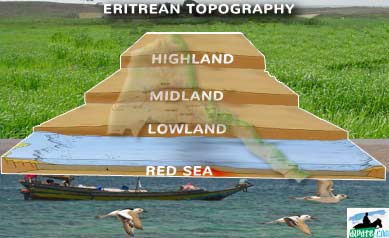Reverse Season on Migration
Dilemma: do we welcome those who abandon the PFDJ, forgetting the pain they inflicted on us because we dared to oppose the regime, and move on, or should we insist on holding them accountable for their past actions? Today, many are facing a dilemma after Abdulkadir Hamdan, a journalist and veteran of the struggle era, seems to have abandoned the regime. This is a reoccurring development that we face and will always face, and it will repeatedly test our principles if Isaias continues to rule Eritrea.
As traumatized people, we have been hurt, and we have hurt others over differences of views regarding the single party rule. Hamdan had smeared my name and the name of awate.com, which I built with sweat and blood. He cleverly set the tone against awate.com and me, it’s still prevalent among the PFDJ supporters. How do I feel and how should I address the issue of Abdulkadir Hamdan? I decided on a two-pronged response: welcome him sincerely while at the same time releasing the steam from my chest, a steam of the damages he inflicted on me and others. And, because that represents my principles of accountability and magnanimity; my main motto has always been to help bring about an Eritrea that reconciles its differences. An Eritrea that is at peace with itself and everybody else. So, I congratulate Hamdan for embracing his old position and for speaking out. And I welcome him wholeheartedly.
However, probably, the habit of welcoming anyone who abandons the PFDJ shrine was not a good strategy; magnanimity must have been coupled with accountability. But still, I hope Hamdan realizes the harm he inflicted on others and reconciles it with his conscience; he was not careful when he fed false arguments to the PFDJ propaganda machine operators who are still chewing on it.
Differences of opinion are perennial
The young could consider the acute differences that we are going through, a new phenomenon. Some of the older individuals might purposely forget it, frame it as inconsequential or describe it with bias and prejudice. Yet, enough people know our differences are a continuation of our social ills and fragmented politics.
1960s was an eventful decade; the igniting of the Eritrean armed struggle was just one. And though there were political upheavals in that era, the1967 Israeli Arab war was the most impactful on the Eritrean struggle. In 1967, the Arabs were defeated; the Suez Canal was closed, and it caused dire economic consequences for the region; in 1968, the only Marxist state in the region was established in South Yemen, and many influential Arab businessmen left Eritrea for Aden; between 1963 and 1976, the Marxist Dhofar Liberation Front was fighting against Sultan Said bin Timor of Oman and declared to fight British interests in the Gulf States; in 1969, Jaafer Numeiri led a military coup and controlled power in Sudan, he ruled a single party state, the Sudanese Socialist Union, which he established.
In 1967, French Somaliland was renamed “Afar and Issa” until 1977, when it voted for independence and adopted the name Djibouti for the country.
By 1968, Gamal Abdelnasser was still trying to reverse defeat through a war of attrition in the Israel-occupied Sinai-Peninsula. Probably exhausted by the aftermath of the war, in 1970 he suffered a heart attack while attending the Arab League summit, and died.
In 1969, Ziad Barre, the commander of the Somali National Army, carried a coup d’état, and established a Marxist-Leninist single party, the Supreme Revolutionary Council.
Also in 1969, Muammar Ghaddafi overthrew King Senusi and ruled the country, which he renamed the Great Socialist People’s Libyan Arab Jamahiriya until he was killed in 2011 by Libyan rebels.
Scorched Earth Policy
The Eritrean countryside went through an aggressive assault by the Ethiopian forces, whose government launched a scorched earth policy affecting many parts of Eritrea, though the lowlands was devastated as Ethiopian fighter jets machine gunned villages, followed by frequent military campaign by the Tor-Serawit and Commando soldiers. Starting 1967, tens of thousands of villagers from the Eritrean Lowlands fled to Sudan, where they are still hosted in refugee camps.
The rank and file of the ELF were demoralized, thinking the struggle was decimated and would not rise again. Combatants deserted their units and scattered everywhere or surrendered to Ethiopia. Morale was damaged and led to splinters within the ranks. It was in this situation that the 1969 Adobha conference was held.
In that conference, 38 members of the general command were elected, including Isaias Afwerki, the current and only president of Eritrea since 1991, and Abdulkadir Hamdan. But the differences and fragmentation continued after Adobha, including the split of the late Osman Saleh Sabbe. It’s widely believed the split was based on the rivalry between Osman Sabe and Idris Glawdeos, both respected senior leaders of the struggle. Abdulkadir Hamdan grudges and grievances are rooted in that era.
The Grievances of A. Hamdan
The ELF arrested Hamdan and other members of the so-called Red Sea group, (ELF-PLF) that was birthed by Sabe; Hamdan was in that group. Gradually, the PLF groups (PLF1 and PLF2), and Selfi Natsenet (led by Isaias Afwerki after the death of Abraham Tewelde) morphed into an alliance. In 1977, the EPLF was founded by the group. After the independence of Eritrea in 1991 and 1993, the EPLF was swallowed by the PFDJ.
In the nineties, Hamdan was among the few staunch critics of Isaias and the PFDJ. He inflicted unimaginable damages on Isaias and his party through a newsletter he issued. In 1998, when the Ethio-Eritrean border war erupted, Hamdan switched sides and became an ardent supporter of the regime and a staunch enemy of its opponents. He ruthlessly attacked many, not even sparing individuals he didn’t know at all, and destroyed all the political bridges and many ties needed for reconciliation.
But Hamdan’s unwarranted attacks had invited counterattacks matching his ruthlessness. Yet, he became more aggressive. My colleagues and I solicited explanations through Gedab News from the people on the PFDJ loop.
Soon, the leaflet he published in Germany became a full-fledged newspaper. It was widely distributed all over the world through the PFDJ embassies and community centers.
The late Prof Tekie Fessahatsion used to taunt and advise us to tread Hamdan’s path and become “loyal opposition.” That was a topic for laughter among our circles. However, loyal opposition means a submissive, unassertive opposition and many didn’t find it appealing.
According to several officials of the regime, “Hamdan’s patron in the PFDJ was [the late] Alamin Moh’d, Saeed who convinced him to mend fences and became a “loyal opposition”. That worked. Hamdan benefited from funds granted by a German NGO for the development of free press in Eritrea. Thus, as Hamdan’s star rose in the PFDJ circles and he was dignified with the “loyal opposition” tag, most of the reporters and editors of the nescient Eritrean free press were arrested and remain incommunicado since 2001.
Hamdan explains that Isaias had appointed him as a consultant to the PFDJ embassy and as the PFDJ media chief in Europe (contested claim). He was also appointed as Eritrea’s representative to UNICEF. However, the PFDJ local officers, embassies and party operatives ostracized him; they “treated [him] with suspicion.” His frustration was evident in the interviews he did with Abubaker Saiq (incidentally, I must thank for the excellent interview he conducted).
I have never met Hamdan, though in the 1990s, I read his news bulletin a few times. However, after I established awate.com in 2000, Hamdan became part of the defamation campaign that was waged against awate.com, myself, and my colleague Saleh Younis. His prejudice and empty allegations were spilled in Dec 2001 in an interview he made with “RahwaTv”, a local Eritrean community television program in Sweden. I have a VHS copy of the program and will try to digitize it, provided it is salvageable. But you can find the link to the Awate Team response for the defamatory allegation below.
Welcoming Hamdan
Finally, that was then; it’s now history. Hamdan has come to the right parking spot that he abandoned, and he is welcome. I feel relieved that I explained my misgivings, not forgetting the gullible PFDJ supporters who are still chewing and repeating the allegations that Hamdan leveled against me. But it’s the nature of the inept PFDJ supporters who parrot what they hear without verifying if it serves their narrow interest. Now that Hamdan has made poignant remarks on the inner workings of the PFDJ, the timid character of its illusionary senior officials, and the force that moves them from behind the veil (akin to a deep state), I hope the supporters of the regime shun propaganda, social skepticism, and sham ethnic representation.
I would like to congratulate Hamdan for finally reassuming his journalist role and for abandoning the PFDJ. But importantly, it’s my wish that this is not considered an attack but cleaning the bad aftertaste that his attack left on my taste buds. As for apologies, personally, I’m not interested in it, but I urge him to talk to those he unfairly characterized, including the recent ones and mend fences.
Hamdan could also help by forming a Hagere Ertra movement that would consult the dropouts from the PFDJ shrine after the recent pilgrimage. Maybe that movement would choose a bright color, produce T-shirts, and start 3rd WW. Just for a change.




Awate Forum